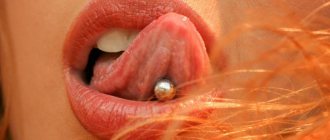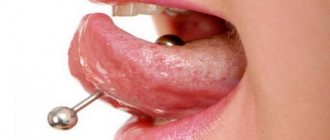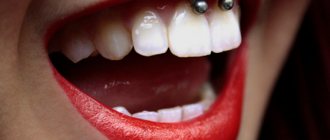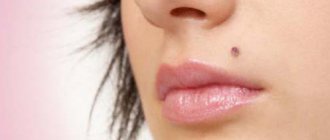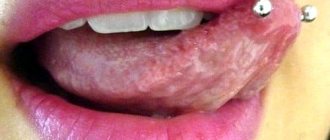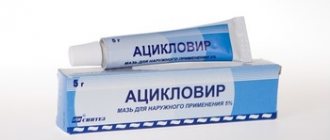Piercing using the Smile technique is a piercing of the frenulum under the upper lip. The name comes from the English word “Smile” - smile. The presence of jewelry in the mouth is visible only when a person smiles. The piercing technique appeared more than 1000 years ago. It was used by women in African countries, but it was not widely used. Only at the beginning of 2000. Piercings began to be done in Europe by young people who belong to different musical subcultures. Only 3-4 years later, the fashion for mouth jewelry began to spread throughout the world.
Features of the puncture site, pros and cons
Piercing under the upper lip is invisible to others. When the mouth is closed, the frenulum is not visible. Therefore, the “Smile” piercing technique is suitable for people who follow a dress code at work, where wearing provocative jewelry is prohibited.
Other benefits of piercing:
- ease of replacing earrings;
- rapid restoration of the mucous membrane after a puncture;
- You can remove the jewelry, after which the hole will heal without a trace in 2-3 weeks.
Small earrings are usually inserted into the hole, which, when worn, do not interfere with conversation, eating, or oral hygiene. Jewelry for piercing under the upper lip is chosen in the shape of a horseshoe, half ring, or micro banana.
Cons of piercing:
- there is a possibility of complications developing;
- constant feeling of the presence of a foreign object in the mouth;
- Possible damage to tooth enamel.
Smiley piercing: photos and reviews of owners
Interesting fact: lip frenulum piercing is becoming increasingly popular not only among rebellious youth, but also among fully grown and respectable people. This trend is explained simply - despite all its extravagance, the “smiley” is very easy to hide. With such a piercing, you can work in a reputable company that has strict dress code requirements, or in a municipal organization. The piercing really looks interesting; you can insert a variety of jewelry into it and change them according to your mood.
As for the practical part of the question, after healing the “smile” does not require special care. Many owners of such a piercing admit that over time they completely forget about their unusual jewelry. Smile piercing also has negative reviews: for some, the earring bothers them, and some face various problems - for example, infection or rupture of the frenulum. However, if you really want to become the owner of such a puncture, you should take a risk. If you don’t like it for some reason, you can always pull out the decoration, and very soon the channel will be overgrown.
Puncture pain
The Smile piercing is practically painless. In 90% of cases it is done without the use of anesthetics.
Indications for pain relief:
- a thick frenulum, which is difficult to pierce without pain;
- low pain threshold;
- panic state in a person (from fear he may twitch and injure himself on the instrument during a puncture).
For pain relief, local drugs are used (Lidocaine, Novocaine, Anestezin). If you are prone to allergies, painkillers are not used.
How painful is the procedure?
Conducted under sterile conditions. Due to the absence of pain, anesthesia is not used. The exception is in cases with an excessively thick frenulum or severe susceptibility to pain. In this case, it is necessary to treat the area with a local anesthetic composition - lidocaine.
The puncture is made with a special needle. Upon completion of the process, the mucous membrane of the frenulum heals very quickly. The wound itself ceases to bother you within a month. With proper preparation and compliance with all instructions, side effects do not occur.
Jewelry selection
For a piercing under the upper lip, titanium earrings with a special coating of a non-allergenic composition or jewelry made of medical steel or bioplastic are suitable. These materials do not oxidize over time and do not lose their appearance. They do not emit harmful substances and do not cause harm. Such jewelry is suitable for primary piercing and for daily wear.
According to the shape of the earrings, choose the following:
- horseshoes (it is better to wear such earrings after the wound has completely healed);
- circular;
- segment ring;
- rods;
- rings with a ball or stone;
- clicker rings;
- microbanana.
The ends of the decorations are decorated with cone-shaped or round elements. They should be small so that they do not cause discomfort when worn and do not scratch the enamel of the teeth. Earrings made of precious metals cannot be inserted into the frenulum until the puncture has healed, as the jewelry can oxidize and cause poisoning.
The thickness of the earring should not exceed 1.2 mm, it is better to choose a diameter of 1.6 mm. The bridle is thin, so a small piece of jewelry can break through it.
Carving on the earring
It is better to choose jewelry with internal threads, which are made on the metal itself. Earrings with glued or soldered threads may break. Breakage may result in injury to the oral cavity and loss of jewelry. There is a high probability of swallowing broken elements of the earring, which will lead to damage to the esophagus.
The internal thread does not injure the bridle when threading the jewelry through the puncture. If the product is sanded, there are no protrusions on it that can catch on the skin and scratch it. These earrings are easier to remove when replacing jewelry.
Polishing
The better polished the earring, the faster the piercing will heal. It is better to give preference to products from the expensive segment. They are polished by hand, and the quality of each piece of jewelry is checked.
Earrings produced on an industrial scale are polished with grain. Microdefects remain on the surface of the jewelry. Microbes accumulate in the depressions, and dried blood, lymph and saliva stick to the protrusions. The accumulation of pathogenic flora on the earring leads to infection of the frenulum and the development of complications.
Integrity of decoration
It is preferable to choose titanium earrings, since their production uses the technology of tuck- ing a solid base from a blank without welding the decoration elements. This method of turning eliminates the possibility of harmful impurities, which are contained in the solder used for soldering jewelry elements, getting into the metal alloy. Foreign inclusions can provoke the development of allergies and rejection of the material. A dart from a solid base also helps to achieve maximum smoothness on the surface of the earring.
Earrings made of silver and gold are always made from several elements that are soldered together with solder. If you choose jewelry made from precious metals, you should give preference to products from well-known brands that value their reputation and do not use harmful impurities in the manufacture of jewelry.
Types of lip piercings
The art of body holes came to European countries during the Middle Ages. For the first time, researchers encountered such an unusual approach to decorating themselves while studying African countries.
There are the following types of lip piercings:
- Monroe
– perhaps one of the most beautiful and stylish lip piercing options. Performed on the right side of the face, similar to Marilyn's birthmark. This is a kind of imitation of the mole of a 50s diva. In rarer versions, it is done on both sides, while maintaining complete symmetry;
Monroe lip piercing
Monroe lip piercing
Monroe puncture - Madonna
. This piercing is similar to the Monroe, but it is usually done on the other side. In some sources it is also called Crawford. In theory, it can also be performed on both sides of the mouth, but this is rarely resorted to;
Madonna lip piercing
Piercing Madonna
Piercing Madonna - Smile
, aka puncture of the upper frenulum. A virtually painless procedure to perform. But that's where its advantages end. The main disadvantages of this piercing are the inconvenience of operation and mechanical damage to the teeth. Despite this, tissue is most often pierced at home in this place;
Piercing smiley
Puncture smiley - When piercing jellyfish
The center of the nasolabial cavity is pierced. For a classic style, special earrings with a flat clip are used. In the early 2000s, vertical and horizontal jellyfish became widespread. In them, the puncture is made in a straight line in the chosen direction and a barbell or banana earring is used as an earring;
Filtrum jellyfish
Lip piercing jellyfish
Jellyfish puncture - Lowbrett
– piercing under the lip. It can be horizontal or vertical and belongs to the flat style. Unlike a regular labrette, the earring is located almost not on the chin;
Lowbrett piercing
High lip Lowbrett piercing - Ashley
- a beautiful, but very painful and difficult to heal type of body art. It is done exactly in the middle of the lower lip. One of the rare types of piercings that can be performed on both the external and internal sides. Another feature is that after removing the jewelry, unsightly large scars remain;
Ashley Piercing
Ashley lip piercing
Ashley's piercing - Estrum
characterized by a horizontal arrangement of the earring. Doing it is not only painful, but also dangerous. If the depth of the puncture is chosen incorrectly, the jewelry is rejected by the body, or, conversely, it takes too long to heal and is removed on its own;
Estrum - Labrette
– piercing of the lower lip. For the safety of the oral cavity, it is done below the gum level, which minimizes damage to the teeth. It is recommended to use bananas as decoration, although rings, half rings and eyebrow spikes are also suitable.
Classic labrette
Medusa and lower labret
But the names of female types of lip piercings do not end there. Body art masters often create compositions from individual punctures, creating so-called bites. For example, spider, dog, cyber, snake and shark bites are made. Micro bananas, rings and half rings are used as decoration.
Bite in lip piercing
One of the most interesting body arts in the world is considered to be the dahlia bite - here the earrings are located in the corners of the mouth. Particular importance is attached to the shape of bananas. They can be spherical, spiky and others
Preparing for a puncture
The basic rule of preparing for piercing is oral hygiene. It is necessary to exclude bacterial infection and suppuration of the wound after a puncture, so mouth rinse is added to the care procedures 3 days before the piercing. This is done after every meal.
For rinsing use:
- diluted peroxide (3 drops per 1 tablespoon of water);
- low concentration chlorhexidine;
- saline solution (1 teaspoon of salt per 200 ml of warm water);
- manganese (weak, light pink solution).
Combination of braces and piercing under the upper lip
You should refuse piercing if at the time of its implementation the temperature has risen or there are other signs of a respiratory disease.
The concept of "smile"
A hole is created in the frenulum under the upper lip to accommodate a miniature piece of jewelry. Most often, this type of expression of their image is resorted to by young people or girls who are forced to comply with a dress code that prohibits wearing earrings on the body. Immediately after the procedure, special care should be taken, so initially a hypoallergenic material is selected: titanium, niobium, special plastic or glass.
After the wound heals, it is replaced with a better option. Despite the popularity of gold and silver, in this case they are inappropriate on the mucous membranes. They must be excluded due to oxidation due to continuous contact with saliva. The procedure is only available upon reaching adulthood. At an earlier age, parental consent is required.
Although the terms "smile" and "anti-smile" are similar in sound, despite the same process, there is a difference between them, which lies in the place of piercing. Antismile is a rather complex piercing that causes considerable pain to the patient. It occurs due to the presence of blood vessels and nerve endings here. Based on this, it is better to refrain from any amateur activities and exclude any independent manipulations.
How is the procedure performed?
Algorithm for the procedure:
- The first step is to sterilize all instruments and jewelry.
- The oral cavity and frenulum are sanitized with an antiseptic.
- Anesthesia is used.
- The master pinches the upper lip with forceps and pulls it upward.
- A disposable needle is used to puncture the frenulum.
- Without removing the needle, insert the decoration.
- The final sanitation of the oral cavity and puncture site is carried out.
With proper care of the wound, it heals quickly without complications.
Only 1 puncture can be performed in one session. If the master made a mistake in choosing the place for the piercing or inserted the catheter unsuccessfully, then the next time the frenulum can be pierced only after its complete restoration.
You can do the piercing yourself. The algorithm for piercing the frenulum under the upper lip is similar to the salon procedure. To perform this, you need to create conditions that will meet sanitary standards: treat instruments with an antiseptic, wear sterile gloves and sanitize the oral cavity.
How to do a lip piercing step by step
You can do lip piercing in two ways – with a gun or a needle. All masters recommend using a needle. This is due to the fact that when working with a gun, skin particles fall under the working plates, thereby contributing to blood poisoning during further procedures. Reviews claim that even a professional needle can be replaced by a simple pharmaceutical catheter. What you want to work with – decide for yourself.
Piercing smiley
How to pierce the frenulum of the upper lip or smiley:
- When piercing the navel, ear, nose or other parts of the body, these manipulations are not necessary. But when piercing this area, the most important thing is to reduce salivation. To do this, before starting the procedure, large glands (they are located under the tongue and near the jaws) need to be covered with cotton wool. In dental offices, special tampons are used for this purpose - they can be bought at the pharmacy;
- The future puncture site should be washed with hydrogen peroxide or Chlorhexidine. After this, the upper lip is pulled upward so that thin places can be reached;
- This piercing is very easy to perform at home due to its painlessness. To pierce a smiley, you need to find a white area on the bridle and point the needle there. If the bridle is large enough, then you can experiment with the height of the earring. With a lower setting it will be noticeable during a conversation, with a higher setting it will be practically invisible;
- Afterwards, the tampons are simply removed from the glands and the mouth is rinsed with Miramistin. There is no blood, so further use of cotton balls is not advisable.
To pierce any other area of the lip or perioral space, you will need special clips. They are needed not only for fixation, but also to prevent a beautiful piercing from moving to the side, breaking the symmetry. You can buy these in any specialized stores.
Lip piercing process
If doing a real lip piercing is scary, then you can temporarily get a fake piercing. This is a deception or a fake “puncture”. Such artificial decor will decorate the image for a while and will be able to show the hidden “informal” side of the personality without external damage.
Feelings after a puncture
Unpleasant sensations after piercing persist for the first 3-5 days. Pain is felt when eating, when the skin is stretched while talking or smiling. To relieve discomfort, you can use lidocaine spray, which has a freezing effect, 2-3 times a day. When the pain goes away, the feeling of a foreign object in the mouth will still persist. Some people get tired of this feeling, which becomes the reason for removing the jewelry.
In a month, a full-fledged channel will form around the jewelry. The sensation of a foreign object in the mouth will gradually pass. The more a person gets used to piercing, the more often he “plays” with his tongue with the earring, which sometimes leads to stretching of the frenulum, injury or rejection of the jewelry.
Possible problems
Typically, frenulum piercings heal fairly quickly and without problems. But this does not always happen. The greatest danger is infection during the procedure. Remember that any open wound (and this is how a specially created canal can be classified until it is completely healed) is an entry point for infection. Infection is manifested by the discharge of pus, swelling, and soreness. The best option if such symptoms are detected is to remove the jewelry, treat the puncture site with an antiseptic and consult a doctor. Another possible problem with this type of piercing is frenulum rupture. Such an injury may not only occur during the healing period. You can minimize the likelihood of rupture by choosing the correct puncture site and handling it with extreme caution throughout the entire period of wearing the jewelry. Other consequences of a smiley piercing are dental problems. Many experts argue that any punctures in which jewelry (or parts thereof) are in the oral cavity are harmful to teeth. However, this warning rarely stops real piercing enthusiasts.
Caring for the puncture site
The mucous membrane of the oral cavity is quickly restored if hygiene procedures and sanitation are carried out correctly.
Tips for caring for the puncture site:
- For 6-7 days after piercing, you need to rinse your mouth after eating.
- Do not use alcohol or manganese to sanitize the oral cavity after a puncture. These products will prolong the healing period of the wound.
- When brushing your teeth, you need to be careful not to snag the earring or injure the frenulum.
- You should not drink any alcohol or smoke for 3-4 days after the piercing.
- Do not touch the jewelry with your tongue or hands, so as not to introduce an infection into the wound or injure the puncture site.
The wound heals in about a month, and discomfort after the piercing lasts only 3-5 days. It is better not to kiss for the first 1-2 weeks after the piercing. Bacteria and viruses transmitted through biological fluids can enter an open wound. There is a possibility of transmitting STDs from a partner through saliva.
How is a nose piercing done?
Nose wing piercing
It is performed either without a clamp at all, or using a windowed oval clamp.
The master uses a spatula, cork or tube as a stop for the needle, inserting the instrument into the nostril. nasal
tube is inserted so that it is under the markings.
Interesting materials:
Is it possible to lengthen the sleeves of a shirt? Can vinegar bleach laundry? Is it possible to improve vision without surgery? Can you die from an aneurysm? Can you die from lymphoma? Can you die from nicotinic acid? Is it possible to wash your face after permanent lip makeup? Is it possible to wash your face after tattooing your eyelids? Is it possible to drink alcohol in the park? Can an aneurysm be seen on ultrasound?
Do I need to rotate the earring while the piercing is healing?
You should not touch, let alone scroll, the earring during the first 2-3 weeks after the piercing. If the jewelry is of high quality, then it has a smooth surface, which eliminates the possibility of the product growing into the fabric of the bridle.
If you regularly disturb the wound, the scab will come off prematurely and the puncture will constantly bleed. This will lead to tissue scarring and complications in the future.
Possible complications and consequences
Piercings under the upper lip often heal without complications.
Rarely develop consequences:
- Infection gets into the wound, which leads to suppuration, swelling, and pain at the puncture site.
- Displacement of the earring, its omission due to incorrectly performed piercing.
- Rejection of the material from which the jewelry is made, allergy.
- Damage to tooth enamel, chips.
- Rupture of the frenulum when it is initially thin.
Proper care of the puncture site and avoiding piercing if there are contraindications will help to avoid the development of complications. If after putting on the earring there is discomfort, the frenulum is swollen or bleeding heavily, the jewelry should be removed. After removing the earring, the frenulum heals within a few days without any consequences. The oral mucosa is completely restored after 1.5-2 weeks.
Contraindications and risks
Like any piercing, this piercing has its own characteristics and prohibitions:
- It should be taken into account that this type of piercing wears away tooth enamel, as a foreign object constantly rubs against it.
- If disinfection is insufficient, there is a risk of contracting HIV, hepatitis, stomatitis, suppuration, and inflammation.
- There is a risk of the body rejecting the earring and, as a result, allergic manifestations.
- The jewelry may shift due to deformation of the puncture.
It is prohibited to pierce under the following circumstances:
- pregnancy;
- elevated body temperature;
- menstruation;
- poor blood clotting, anemia;
- HIV disease, hepatitis.
If your gums, teeth, or palate hurt after piercing
Problems associated with the piercing itself are indicated by a local reaction: redness, plaque, bleeding, swelling at the puncture site. If the pain spreads throughout the entire oral cavity, then the cause should be sought in the antiseptic or rinse used.
Each person has a unique microflora in their mouth. Antiseptic and hygiene products can cause individual intolerance. This happens often: 1 case in 20 people. The condition is called stomatitis, which can be quickly treated. Changing the product with solutions with a different composition will help eliminate the pain.
Negative points
Disadvantages include:
- Subsequently, the gap.
- A feeling of discomfort—forgetfulness or interference.
- If displaced, damage to tooth enamel occurs.
Before deciding on the procedure, it is advisable to weigh everything. It’s a good idea to check out the reviews on Instagram. From the nicknames sasha and yak you can get a lot of useful recommendations and learn about some attractive and terrible secrets. The main thing is to follow the basic rules.

